初中英语句型转换教学教材
初中英语句型转换课件

Fuqing Longtian Junior Middle School
Fuqing Longtian Junior Middle School
句型转换是句子类别的
转换。该题的目的在于检测学 生运用各种句型的表达能力。 要求学生对所学的句子结构和 词形的变化做到概念清楚,运 用准确。
书山有路勤为径 学海无涯苦作舟
[例1] The little girl was so tired that she couldn’t go farther.
The little girl was ______ tired ______ go farther.
通过分析,我们不难发现,该题是由复合 句转换为简单句,可用too…to句型。
Fuqing Longtian Junior Middle School
Fuqing Longtian Junior Middle School
[例4] They were tired, so they had a rest. They had a rest ______ they were tired.
书山有路勤为径 学海无涯苦作舟
Fuqing Longtian Junior Middle School
Fuqing Longtian Junior Middle School
(2) 对划线部分提问
Fuqing Longtian Junior Middle School
对划线部分提问是根据划线的内容提出一个特 殊疑问句。即特殊疑问词+一般疑问句构成。
a. 如划线部分是定语,它所修饰的词要 跟随特殊疑问词移至句前。
[例1] This is Kate’s hat. _W__h_o_se_ __h_a_t__ is this?
初中英语句型转换技巧精编版

14
www.art-com.co.kr
反意疑问句的转换
Company Logo
反意疑问句
结构:“陈述句+简短问句”,
规律:“前面肯定;后面否定”和“前面否定; 后面肯 定”的规律和简短问句的主语必须 用代词的要求。
Tom likes playing football,doesn't he?
Xiao Hong didn't like singing,did she?
Copyright © by ARTCOM PT All rights reserved.
www.art-com.co.kr
Company Logo
4.It’s going to be cloudy tomorrow
How is it going to be tomorrow? What is it going to be like tomorrow? 5.The students are planting trees on the hills .
www.art-com.co.kr
1.肯定句、否定句和一般疑问句的转换
Company Logo
(1)含有be动词(am,is,are,was,were)、行为动词(do,doe s,did )和情态动词(can,could,should,will,would,may,might) 及含有have/has+p.p的句子;
He can cook Chinese food.
He can’t cook Chinese food.
They have learned all the subjects. They haven’t learned all the subjects.
牛津英语七年级上册Unit 1短语及句型转换
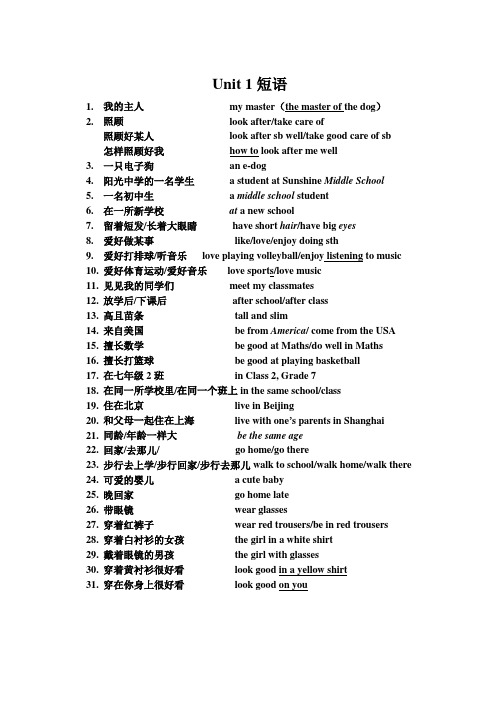
Unit 1短语1.我的主人my master(the master of the dog)2.照顾look after/take care of照顾好某人look after sb well/take good care of sb怎样照顾好我how to look after me well3.一只电子狗an e-dog4.阳光中学的一名学生 a student at Sunshine Middle School5.一名初中生 a middle school student6.在一所新学校at a new school7.留着短发/长着大眼睛have short hair/have big eyes8.爱好做某事like/love/enjoy doing sth9.爱好打排球/听音乐love playing volleyball/enjoy listening to music10.爱好体育运动/爱好音乐love sports/love music11.见见我的同学们meet my classmates12.放学后/下课后after school/after class13.高且苗条tall and slim14.来自美国be from America/ come from the USA15.擅长数学be good at Maths/do well in Maths16.擅长打篮球be good at playing basketball17.在七年级2班in Class 2, Grade 718.在同一所学校里/在同一个班上in the same school/class19.住在北京live in Beijing20.和父母一起住在上海live with one’s parents in Shanghai21.同龄/年龄一样大be the same age22.回家/去那儿/ go home/go there23.步行去上学/步行回家/步行去那儿walk to school/walk home/walk there24.可爱的婴儿 a cute baby25.晚回家go home late26.带眼镜wear glasses27.穿着红裤子wear red trousers/be in red trousers28.穿着白衬衫的女孩the girl in a white shirt29.戴着眼镜的男孩the girl with glasses30.穿着黄衬衫很好看look good in a yellow shirt31.穿在你身上很好看look good on youUnit 1 重点句型1.My name is Millie.=I’m Millie. 我叫米莉。
新人教版新目标七年级英语上册《U...

1 Unit5 Do you have a soccer ball?Period One (1a-1c)一.教材分析:通过uint4单元询问物品在哪的学习,过渡到本单元谈论物品的所属关系。
而本单元的核心语言项目是talk about ownership, 展开学习;以及围绕make suggestions 展开能力训练。
展开能力训练。
主要话题是主要话题是spending time with friends ,培养同学间团结、友爱的精神。
学会使用have 对物品的所属进行提问及回答,以掌握行为动词在一般现在时中的构成和使用;同时引导学生使用所学的句型谈论自己在球类运动中的喜好运动中的喜好,,以及谈论自己对某项运动的感受等。
本部分1a 中的主题图呈现了房间的情景,自然的将学生带入语言交流的自然环境中,引入了房间内常见物品的话题词汇和主要句型。
1a-1c 通过图文及听力练习导入整个单元的话题,是整个Section A 的基础.二.学情分析:本单元的主题是使用have 对物品的所属进行提问及回答,以掌握行为动词在一般现在时中的构成和使用;同时引导学生使用所学的句型谈论自己在球类运动中的喜好。
行为动词在一般现在时的肯定句、否定句和一般疑问句中的构成和使用是初中英语教学中非常重要的内容,七年级的学生经过小学的学习之后,已经具备了一定的英语语言功底,在思维能力方面有较强的记忆力和模仿力,但知识的扩展和运用能力有待于进一步提高,在认知心理方面,学生有较强的求知欲和表现欲。
并初步具备了合作探究能力。
三. Teaching Aims:1. Language goals:Key vocabulary: tennis, soccer, ball, volleyball, basketball, ping-pong2. Target language:----Do you have…? Do you have…?----Yes, I do. /No, I don’t.Yes, I do. /No, I don’t. 3. Ability goalsAsk and answer questions about the ownership.Train the students’ communicative competence and listening skill.4. Moral goalsDo sports every day and keep healthy.四.Teaching important points: 1. The words about ball.2. The target language.----Do you have…? Do you have…? ----Yes, I do. /No, I don’t.Yes, I do. /No, I don’t. ----Does she/he have…? Does she/he have…?----Yes, she/he does./No, she/ he doesn’t.Yes, she/he does./No, she/ he doesn’t. 五.Teaching difficult points:1. Have 与has 的使用的使用2. Do 与does 开头的一般疑问句开头的一般疑问句六.教法与学法:看图认读读单词法,模仿跟读、情境交际,合作交流等方法让学生掌握一些生活学习用品。
人教版初中英语七年级上册期末复习英语句型转换专练

人教版初中英语七年级上册期末复习英语句型转换专练1。
My name is Jim Green (对划线部分提问)_________ _________ ____________?2. Her name is Lucy Green (对划线部分提问)___________ ____________ _______________?3. I am Lucy。
(同义句)________ ________ ________ _________.4.Is your name Gina?(作肯定回答)。
Yes,______ _______ .5.That's my ruler.(作否定句)______ ______ my ruler.6.Call John.His telephone number is 139—4045.(改为一个句子) _______________________________ 。
7.His English name is Mike.(对画线部分提问)______ _______ English name?8.It’s a hat.(对画线部分提问)_______ _______ ?9.This is my friend. (改为一般疑问句)_____ _____ your friend?10.—Is she your cousin?(作否定回答)No,______ ______.11.Those are my brothers。
(改为单数句)______ ______ my _______.12.Emma is her sister. (同义句改写)Emma ______ she _____ ______。
13.This is a backpack. (把a换成two改写句子)________ _______ two ______.把下面所给的单词连成一个结构完整的句子,标点已给出。
初中英语句型转换讲解及练习

句型转换讲解及训练肯定陈述句变否定陈述句步骤:一看情系助二变 第一人称I ,we 变第二人称you my---yoursome-----any something---anything already----yet :并列连词and--or too----either eg: Judy can write stories.________________________________________________ He reads Chinese pomes every morning.________________________________________________ His friend has already mailed the photos._________________________________________________ 陈述句变一般疑问句 ;步骤:一看情系助二变eg :My mother has lunch in the factory._____________________________________________________ {She did very well in her English exam._____________________________________________________ Mary often watches TV at home in the evening._____________________________________________________ There is some milk in the bottle._____________________________________________________*陈述句变选择疑问句的方法:首先将句子变成一般疑问句,然后用or 连接被选择的部分。
初中英语_初中英语八年级上unit 8 (1a教学设计学情分析教材分析课后反思
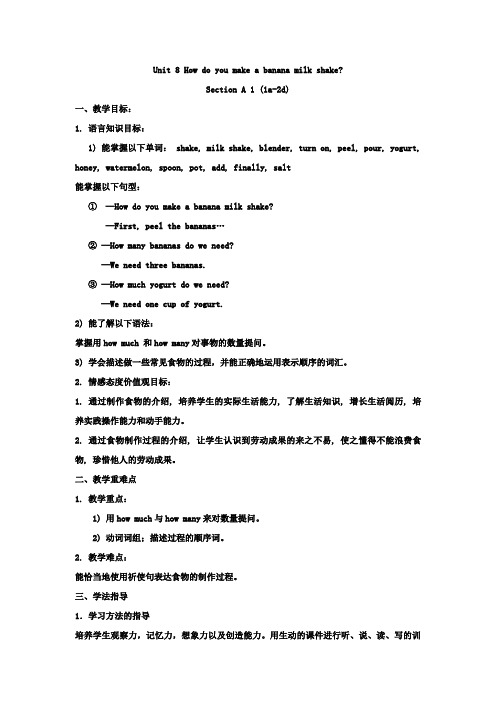
Unit 8 How do you make a banana milk shake?Section A 1 (1a-2d)一、教学目标:1. 语言知识目标:1) 能掌握以下单词: shake, milk shake, blender, turn on, peel, pour, yogurt, honey, watermelon, spoon, pot, add, finally, salt能掌握以下句型:①─How do you make a banana milk shake?─First, peel the bananas…②─How many bananas do we need?─We need three bananas.③─How much yogurt do we need?─We need one cup of yogurt.2) 能了解以下语法:掌握用how much 和how many对事物的数量提问。
3) 学会描述做一些常见食物的过程,并能正确地运用表示顺序的词汇。
2. 情感态度价值观目标:1. 通过制作食物的介绍, 培养学生的实际生活能力, 了解生活知识, 增长生活阅历, 培养实践操作能力和动手能力。
2. 通过食物制作过程的介绍, 让学生认识到劳动成果的来之不易, 使之懂得不能浪费食物, 珍惜他人的劳动成果。
二、教学重难点1. 教学重点:1) 用how much与how many来对数量提问。
2) 动词词组;描述过程的顺序词。
2. 教学难点:能恰当地使用祈使句表达食物的制作过程。
三、学法指导1.学习方法的指导培养学生观察力,记忆力,想象力以及创造能力。
用生动的课件进行听、说、读、写的训练。
2.学习能力的培养通过连贯的听、说、读、写、表演等技能,培养学生的交际能力,发展他们的思维能力。
3.学习策略的指导在课堂教学中把学生分成两人或四人小组的学习小组,让他们围绕着课堂任务相互交流、相互合作,从而获得知识、技能和情感体验,发展学生的自主学习能力。
初中句型转换教案模板

教案标题:初中句型转换教学一、教学背景1. 课程标准要求:根据《义务教育英语课程标准(2011年版)》,初中阶段学生需掌握基本的句型转换技巧,提高英语表达能力。
2. 学生情况分析:初中生已具备一定的英语基础,但对句型转换的掌握程度参差不齐,需要通过有针对性的教学提高他们的句型转换能力。
3. 教学内容:本节课将围绕常见的句型转换技巧展开,如:主动语态与被动语态的转换、陈述句与疑问句的转换等。
二、教学目标1. 知识目标:让学生掌握几种常见的句型转换技巧,并能运用到实际语境中。
2. 能力目标:通过练习,提高学生的句型转换能力,增强英语表达能力。
3. 情感目标:激发学生学习英语的兴趣,培养他们积极向上的学习态度。
三、教学重点与难点1. 教学重点:句型转换技巧的运用。
2. 教学难点:句子结构的变化和语义的转换。
四、教学过程1. 导入:通过图片或情景引入本节课的主题,激发学生的学习兴趣。
2. 知识讲解:讲解几种常见的句型转换技巧,如主动语态与被动语态的转换、陈述句与疑问句的转换等。
3. 实例分析:给出实例,让学生观察并分析句子在转换过程中的变化及意义。
4. 课堂练习:设计练习题,让学生运用所学句型转换技巧进行实践。
5. 小组讨论:学生分组讨论,分享彼此的解题心得,互相学习。
6. 总结与反馈:对本节课的内容进行总结,并对学生的学习情况进行反馈。
7. 拓展延伸:布置课后作业,让学生进一步巩固所学知识。
五、教学评价1. 课堂参与度:观察学生在课堂上的积极性、主动性。
2. 练习完成情况:评估学生在练习中的表现,检验他们对句型转换技巧的掌握程度。
3. 课后作业:通过学生完成的课后作业,了解他们对课堂所学知识的巩固情况。
六、教学反思本节课结束后,教师应认真反思教学效果,针对学生的实际情况调整教学策略,以提高句型转换教学的针对性和有效性。
同时,关注学生的个体差异,激发他们的学习兴趣,培养他们积极向上的学习态度。
初中英语七年级必备-整理版-句型转换(陈述句变一般疑问句特殊疑问句及测验)
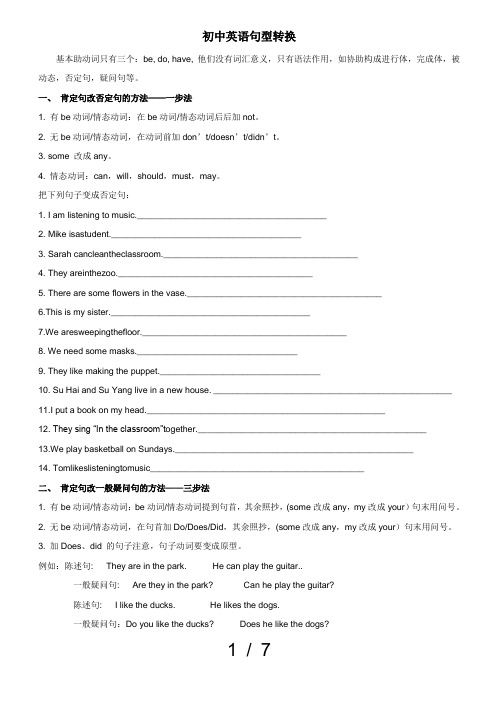
初中英语句型转换基本助动词只有三个:be, do, have, 他们没有词汇意义,只有语法作用,如协助构成进行体,完成体,被动态,否定句,疑问句等。
一、肯定句改否定句的方法——一步法1. 有be动词/情态动词:在be动词/情态动词后后加not。
2. 无be动词/情态动词,在动词前加don’t/doesn’t/didn’t。
3. some 改成any。
4. 情态动词:can,will,should,must,may。
把下列句子变成否定句:1. I am listening to music._______________________________________2. Mike isastudent._______________________________________3. Sarah cancleantheclassroom.________________________________________4. They areinthezoo.________________________________________5. There are some flowers in the vase.________________________________________6.This is my sister._________________________________________7.We aresweepingthefloor.__________________________________________8. We need some masks._________________________________9. They like making the puppet._________________________________10. Su Hai and Su Yang live in a new house. _________________________________________________11.I put a book on my head._________________________________________________12. They sing “In the classroom”t ogether._______________________________________________13.We play basketball on Sundays._________________________________________________14. Tomlikeslisteningtomusic____________________________________________二、肯定句改一般疑问句的方法——三步法1. 有be动词/情态动词:be动词/情态动词提到句首,其余照抄,(some改成any,my改成your)句末用问号。
初中英语:句型转换口诀教学法

初中英语:句型转换口诀教学法口诀句型变化很简单,/ 先把句中动词看:/be may must will can,/ 否定句not加后边。
/ 一般问句也不难,/ 助情动词放句前;/ 两种回答yes no,/ 句首动词人后面。
/ 没有现成怎么办?/ do does did来相伴,/ 三单式过去要还原。
/ 特殊问句更简单,/ 疑问词后跟一般。
/ 事物职业等what,/ who人where问地点,/ whose谁的所有权。
/ 数量how many 复后边,/ how much不可数和价钱。
/ why问原因慢慢谈,/ what time when时间,/ how old岁数多少年?/ how be人身永康健!例析上述口诀表明:句型变化的关键是识别和取决于句中的动词。
如果句中有现成的be ,have,used,may ,must ,will ,can等助动词或情态动词,则在其后直接加上not即构成否定句;将其提于句首则成为一般疑问句,在简略回答中,除there be句型外,在yes 或no后边一般要使用“人称代词主格+助动词或情态动词成分”,其中的助动词或情态动词应该与问句保持一致。
例如,(1) That’s her grandfather over there(改为否定句和一般疑问句并回答)。
根据口诀,我们发现句中有现成的be动词is ,不需要其他的助动词来协助,故本句的否定句为:That’s not her grandfather over there;一般疑问句及回答为:Is that her grandfather over there?Yes,he is;/ No,he isn’t. (2) Tom used to read Chinese histories.(改为否定句和一般疑问句并回答),句中的used是一个突破口,故否定句为Tom used not to read Chinese histories;一般问句和回答为Used Tom to read Chinese histories ?Yes,he used;/ No,he usedn’t. 但根据传统习惯,本句也可以将used视为行为动词use的过去式,故其否定句和一般疑问句及回答分别是Tom didn’t use to read Chinese histories和Did Tom use to read Chinese histories ?Yes,he did;No,he didn’t .“没有现成怎么办”指的是句中没有be ,have,used,may ,must ,will ,can等助动词或情态动词的情况。
初中英语 人教版八年级上册unit6-unit10句型转换专练
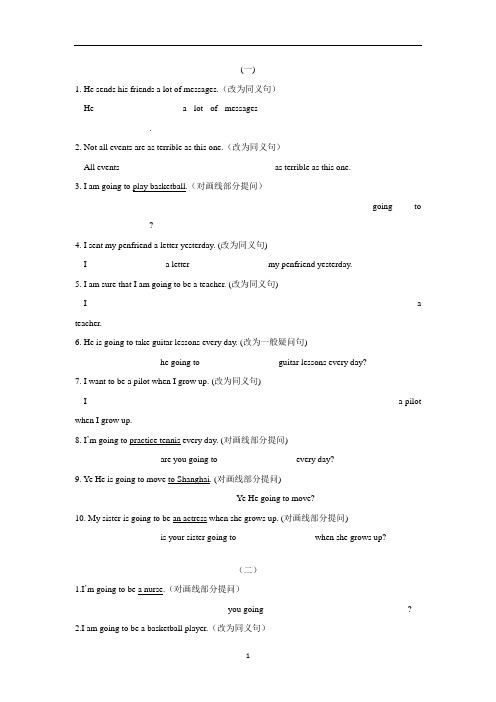
(一)1. He sends his friends a lot of messages.(改为同义句)He _________________ a lot of messages _________________ _________________ _________________.2. Not all events are as terrible as this one.(改为同义句)All events _________________ _________________ as terrible as this one.3. I am going to play basketball.(对画线部分提问)_________________ _________________ _________________ going to _________________?4. I sent my penfriend a letter yesterday. (改为同义句)I _________________ a letter _________________ my penfriend yesterday.5. I am sure that I am going to be a teacher. (改为同义句)I _________________ _________________ _________________ _________________ a teacher.6. He is going to take guitar lessons every day. (改为一般疑问句)_________________ he going to _________________ guitar lessons every day?7. I want to be a pilot when I grow up. (改为同义句)I _________________ _________________ _________________ _________________ a pilot when I grow up.8. I’m going to practice tennis every day. (对画线部分提问)_________________ are you going to _________________ every day?9. Ye He is going to move to Shanghai. (对画线部分提问)_________________ _________________ Ye He going to move?10. My sister is going to be an actress when she grows up. (对画线部分提问)_________________ is your sister going to _________________ when she grows up?(二)1.I’m going to be a nurse.(对画线部分提问)________________ ________________ you going ________________ ________________? 2.I am going to be a basketball player.(改为同义句)I ________________ ________________ ________________ a basketball player.3.Mr Green is going to move to Beijing next month.(对画线部分提问)________________ ________________ Mr Green going to move next month? 4.He could cook a big meal.(改为同义句)He ________________ ________________ ________________cook a big meal.5.The little boy is so short that he can’t reach the box.(改为同义句)The little boy is ________________ short ________________ reach the box.6. I promise to learn English better.(改为同义句)I ________________ ________________ I will learn English better.7. She is going to take acting lessons tomorrow.(改为否定句)She ________________ going to ________________ acting lessons tomorrow. 8. We’d better make a weekly plan for schoolwork.(改为同义句)We’d better make a plan for schoolwork ________________ ________________.9. The resolution is so hard that he can’t keep it.(改为同义句)For him, the resolution is ________________ hard ________________ keep.10. I can ride a bike.(改为同义句)I ________________ ________________ ________________ ride a bike.(三)1. Sally will be a_singer in six years. (对画线部分提问)______________ ______________ Sally be in six years?2. I’ll play tennis with Lucy. (改为一般疑问句)______________ ______________ play tennis with Lucy?3. I think there will be more trees. (改为否定句)I ______________ ______________ there ______________ be more trees.4. There were some trees near the river. (用next year改写句子)There ______________ ______________ some trees near the river next year.5. They’ll stay in the countryside for a week. (对画线部分提问)______________ ______________ ______________they stay in the countryside?6. People will have robots in their homes. (改为同义句)There ______________ ______________ robots in people’s homes.7. We will have a party this Sunday. (改为否定句)We ______________ ______________ a party this Sunday.8. They will go to the zoo tomorrow. (对画线部分提问)______________ ______________ they ______________ tomorrow?9. Everything will be free. (改为一般疑问句)______________ everything ______________ free?10. There will be a sports meeting this weekend. (改为同义句)There ______________ ______________ ______________ ______________ a sports meeting this week.(四)1. The cities will be more crowded in 100 years. (对画线部分提问)________________ ________________ the cities ________________ ________________ in 100 years?2. I think he can finish doing the work on time. (改为同义句)I think he will ________________ ________________ ________________ finish doing the work on time.3. Mr Brown will go to London by plane next week. (改为同义句)Mr Brown will ________________ ________________ London next week.4. I will leave Shanghai in ten days. (对画线部分提问)________________ ________________ ________________ you leave Shanghai?5. There are some students on the playground. They are playing basketball. (合并为一句话) There ________________ some students ________________ basketball on the playground.(五)1. Y ou can’t go out alone at night. (改为祈使句)________ ________ out alone at night.2. There is some chicken in the bowl. (对画线部分提问)________ ________ chicken is there in the bowl?3. —Do you know ________ ________ plant a tree? (根据答句补全问句) —Yes, first dig a hole, and then...4. We need one cup of yogurt. (对画线部分提问)________ ________ yogurt do you need?5. There are ten apples in the basket. (对画线部分提问)________ ________ apples are there in the basket?6.Y ou can’t drink the cold water. (改为祈使句)the cold water.7.We need a bottle of milk. (对画线部分提问)________ ________ ________ do you need?8.Remember to lock the door when you leave the room. (改为同义句)to lock the door when you leave the room.9.They would like two pears. (对画线部分提问)________ ________ ________ would they like?10.Y ou should put the fruit into a bowl now. (改为祈使句)the fruit a bowl now.(六)1. Jane has to do her homework first. (改为否定句)Jane ________ ________ to do her homework first.2. I can go to the zoo with you after lunch. (改为一般疑问句)________ ________ ________ to the zoo with me after lunch?3. His parents will leave for Shanghai next week. (改为同义句)His parents ________ ________ for Shanghai next week.4. Will you be free this afternoon? (改为同义句)Will you ________ ________ this afternoon?5. Can you go climbing with us this Sunday morning? (改为同义句)________ you ________ ________ go climbing with us this Sunday morning?6. Dave is not free on Friday night. (改为同义句)Dave is not ________ on Friday night.7. Jenny has to help her parents. (该为一般疑问句)________ Jenny ________ to help her parents?8. Please get all the books ready for the next term. (改为同义句)Please ________ all the books ________ the next term.9. Tom stayed until his parents came back yesterday. (改为同义句)Tom ________ ________ until his parents came back yesterday.10. Can you come to my party tomorrow? (作肯定回答)Sure, ________ ________ ________.(七)1. They go to work on weekdays. (改为同义句)They go to work ________ Monday ________ Friday.2. Thanks so much for inviting me. (改为同义句)Thanks so much for ________ ____________.3. His father hurried to work. He didn’t say goodbye. (改为同义句)His father hurried to work ________ ________ goodbye.4. It’s Tuesday today. (对画线部分提问)________ ________ is it today?5. I can receive a letter from my students once a week. (改为同义句)I can ________ ________ my students once a week.6. Tim’s birthday party is on Sunday afternoon. (对画线部分提问)________ ________ Tim’s birthday party?7. I can go to the movies with you next Sunday. (改为一般疑问句)________ ________ ________ to the movies with me next Sunday?8. Alice studied for a math test last night. (改为否定句)Alice ________ ________ for a math test last night.9. Mr.Smith will leave for Wuhan the day after tomorrow. (改为同义句)Mr. Smith ________ ________ for Wuhan the day after tomorrow.10. She has to do the housework on weekends. (改为否定句)She ________ ________ to do the housework on weekends.(八)1. You can’t bring your friends to the party. (改为祈使句)________ ________ your friends to the party.2. He will be late if he walks to school. (对画线部分提问)________ ________ ________ if he walks to school?3. If you go to the movies with us, you will have fun. (改为同义句)If you go to the movies with us, you will ______ ________ ________ ________.4. I don’t know what I should do about going to Tom’s party. (改为同义句)I don’t know what ________ ________ about going to Tom’s party.5. Get up quickly, or you will miss the school bus. (改为同义句)________ you ________ up quickly, you ______ ________ the school bus.6. You will enjoy yourself if you go to the party with us tomorrow. (改为同义句)You will ________ ________ ________ ________ if you go to the party with us tomorrow.7. She will go to the movies if it is fine tomorrow. (对画线部分提问)________ will she ________if it is fine tomorrow?8. Mary is so tired that she can’t walk anymore. (改为同义句)Mary is ________ tired ________ walk anymore.9. I think I will stay at home this evening. (改为否定句)I ________ think I________ ________ at home this evening.10. Could you tell me? How do I get to your home? (合并为一句话)Could you tell me ________ ________ ________ to your home?(九)1. I think I will visit the old people’s home tomorrow.(对画线部分提问)________do you think you________ ________tomorrow?2. She will travel around the world. She will have enough money next year. (用if合并为一句) She will travel around the world ________ she ________ enough money next year.3. Tony will get into a fight with his friend. (改为否定句)Tony________ ________ into a fight with his friend.4. Could you tell me how I can get to the new apartment? (改为同义句)Could you tell me ________ ________ ________ to the new apartment?5. Get up early, or you’ll be late for the meeting. (改为同义句)________ you________ ________ late, you’ll be late for the meeting.6. She will travel around the world. (改为否定句)She ________ ________ around the world.7. If I go to the party, I’ll bring them some flowers. (对画线部分提问)________ ________ you bring ________if you go to the party?8. If you don’t run fast, you’ll be late. (改为同义句)________ you ________ fast, you’ll be late.9. The teachers always tell us not to forget to finish our homework. (改为同义句)The teachers always tell us ________ ________ to finish our homework.10. To get good advice from an expert is best. (改为同义句)________ best ________ ________ good advice from an expert.参考答案:(一)1. sends;to his friends2. are not3. What are you;do4. sent;to5. am sure to be6. Is;take7. would like to be8. What;do9. Where is10. What;be(二)1. What are; to be2. want to be3. Where is4. was able to5. too; to6. promise that7. isn’t;take8. every week9. too;to10. am able to(三)1.What will2.Will you3.don’t think;will4.will be5.How long will6.will be7.won’t have8.What will;do9.Will;be10.is going to be(四)1.What will;be like2. be able to3. fly to4.How soon will5. are;playing(五)1. Don’t go2. How much3. how to4. How much5. How many6. Don’t drink7. How much milk8.Don’t forget9.How many pears10.Put;into(六)1.doesn’t have2.Can you go3.are leaving4.be available5. Would;like to6.available7. Does; have8. prepare;for9. didn’t leave 10. I’d love to(七)1.from; to2.your invitation3. without saying4.What day5.hear from6.When is7.Can you go8.didn’t study9.is leaving10.doesn’t have(八)1.Don’t bring2.What will happen3. have a great/good time4.to do5. If; get; will catch6.have a good time7.What; do8. too;to9.don’t; will stay10.how to get(九)1.What;will do2.if;has3. won’t get4.how to get5.If;get up6.won’t travel7.What will;them8. Unless;run9.to remember 10. It’s;to get。
初中英语句型转换

初中英语句型转换肯定句陈述句否定句句型一般疑问句疑问句特殊疑问句一、陈述句1、概述用来叙述一个事实或观点的句子叫陈述句(declarative sentence)。
陈述句有肯定和否定两种形式,一般用降调,句末用句号。
2、语序陈述句的语序一般是“主语+谓语部分”,或“主语+系动词+表语”。
The ruler is blue.这把尺子是蓝色的。
I’m a student.我是一个学生。
I lost my way.我迷路了。
He likes playing cards.他喜欢玩卡片。
You can give it to me.你可以把它拿给我。
3、否定结构用not和助动词或情态动词否定,not一般放在助动词或情态动词之后。
I’m not a thief.我不是小偷。
I can not swim.我不会游泳。
He doesn’t like sports.他不喜欢运动。
4、肯定句和否定句的转换:(句中有some,要改成any.)第一步:看句中有没有be动词(am、is、 are、 was、 were)、和情态动词(can、could、must、will、would、shall、should、may、might等),如果有,则直接在其后面加not,例如:The ruler is blue.这把尺子是蓝色的。
(改为否定句)The ruler is not blue.这把尺子不是蓝色的。
I can swim.我会游泳。
(改为否定句)I can not swim.我不会游泳。
第二步:如果句中没有be动词情态动词,则根据谓语动词的形式借助do的相应形式放在谓语动词前面。
具体方法是:如果谓语动词是原形或者主语是第一人称、第二人称、第三人称复数则借助do;如果谓语动词是一般现在时第三人称单数形式,则借does;需要注意的是,借does后,原句的谓语动词要变回原形;如果谓语是过去式,则借助did,例如:He likes sports.他喜欢运动。
初中英语语法大全:句型转换

Ⅰ.题型介绍所谓“句型转换”就是先给⼀个完整的句⼦A,再根据括号内的要求(有时没有明确,须⾃⼰观察),在第⼆个句⼦B的空⽩处填上适当的词来完成的句型转换。
Ⅱ.题型分类从形式上看,有如下⼏种形式:①某⼀词或词组的转换;②词组与句⼦的转换;③同义句型的转换;④为纠正常犯语⾔错误⽽设计的题⽬。
从内容上看,此题型涉及的⾯较⼴,主要有:①句⼦功能⽅⾯的转换。
包括陈述句(肯定与否定)、四种题疑问句、祈使句、感叹句的转换;②句⼦结构⽅⾯的转换。
即简单句、复合句、并列句之间的转换;③语态的转换。
即主动语态与被动语态之间的转换;④常⽤句型与词汇⼿段的转换。
Ⅲ.具体分类如下⼀、陈述句与疑问句、祈使句、感叹句间的转换1、陈述句中肯定句变为否定句,⼤部分是⽤not来改变谓语结构,但也有借⽤否定意义的词,如nothing, nobody, none, neither, little, few, never, hardly等,例如::A:Tom does well in maths.B:Tom doesn't do in maths.A:He has much to do.B:He has nothing to do.A:All of my classmates like art.B:None of my classmates likes art.2、改为疑问句。
根据上下句的结构和词的减少,来判断变为哪⼀种形式的疑问句。
例如:A:My brother often has breakfast at school.B: Does your brother often have breakfast at school?A:Tom's already weak in English.B:Tom's already weak in English, isn't he ?A:The red light changes every two minutes.B:How often does the red light change?3、改为感叹句。
初中英语 牛津译林七年级上册句型转换和词汇专题
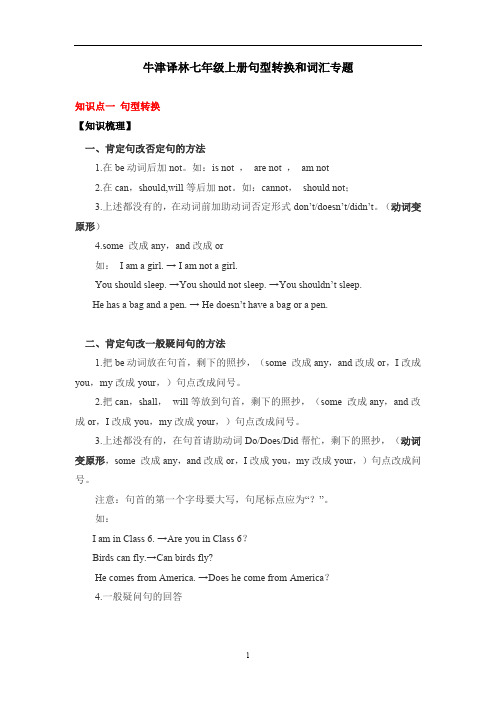
牛津译林七年级上册句型转换和词汇专题知识点一句型转换【知识梳理】一、肯定句改否定句的方法1.在be动词后加not。
如:is not ,are not ,am not2.在can,should,will等后加not。
如:cannot,should not;3.上述都没有的,在动词前加助动词否定形式don’t/doesn’t/didn’t。
(动词变原形)4.some 改成any,and改成or如:I am a girl. → I am not a girl.You should sleep. →You should not sleep. →You shouldn’t sleep.He has a bag and a pen. → He doesn’t have a bag or a pen.二、肯定句改一般疑问句的方法1.把be动词放在句首,剩下的照抄,(some 改成any,and改成or,I改成you,my改成your,)句点改成问号。
2.把can,shall,will等放到句首,剩下的照抄,(some 改成any,and改成or,I改成you,my改成your,)句点改成问号。
3.上述都没有的,在句首请助动词Do/Does/Did帮忙,剩下的照抄,(动词变原形,some 改成any,and改成or,I改成you,my改成your,)句点改成问号。
注意:句首的第一个字母要大写,句尾标点应为“?”。
如:I am in Class 6. →Are you in Class 6?Birds can fly.→Can birds fly?He comes from America. →Does he come fr om America?4.一般疑问句的回答一般疑问句有两种回答,即:肯定回答和否定回答。
其中,肯定回答用yes,否定回答用no。
语句顺序为:Yes + 主语+ am /is/ are/can/do/does/did.;No + 主语+ am not/ isn’t/ aren’t/can’t/don’t/doesn’t/didn’t. 如:—Are you an English teacher?→Yes,I am. /No,I am not.—Is that a bird?→Yes,it is./ No,it isn’t.三、对划线部分提问“对划线部分提问”是小学阶段英语学习的难点,但是一旦掌握了规律,就变得容易多了。
同义句转换类型大全初中英语

1.第三章句型转换表述同一意思,可以用多种不同的表达方式。
这在英语学习中表达为运用不同句型来表述同一意思。
细微而言,表述同一意思的各个不同句型各有其语义上的倾重点;但一般情况下,尤其是对初学者而言,这种细微的“异〞并不要求强调。
换言之,是要求从“同〞的角度来看待表述同一意思的不同句型。
本章拟以列举实例的方式来作一综合介绍。
一、一句多讲今天天气怎么样?Howistheweathertoday?Whatistheweatherli ketoday?你怎么啦?Whatisthematter withyou?What’syourtroub le?What’swrongwithyou?是上学的时候了。
It’stimeforschool.It’stimetogotoschool.这男孩今天16岁了。
Theboyissixteen(yearsold).Theboyisatthe ageofsixteen.Heisaboyofsixteen.我把门翻开你不介意吧?DoyoumindifIopenthedoor?Doyoumindmyopen ingthedoor?他每天花1小时做作业。
Ittakeshimanhourtodohishomew orkeveryday.Hespendsanhour(in)doinghishomewo rkeveryday. Hespendsanhouronhishomeworkeveryday.自从1992年以来上海发生了巨大的变化。
GreatchangeshavetakenplaceinShan ghaisince1992. TherehavebeengreatchangesinShanghaisince1992. Shanghaihaschangedalotsince1992.她的父亲去世5年了。
Herfatherdiedfiveyearsago. Herfatherhasbeendeadforfiveyears.Itisfiveyearssinceherfatherdied.10.(这里用Ithasbeenfiveyears亦可。
初中八年级英语教学案例模板

初中八年级英语教学案例模板通过各类这些国家的印刷和电子媒体,英语已成为国际主导语言之一,在许多地区和专业的环境下的语言也有主导地位。
一起来看看初中八年级英语教学案例!欢迎查阅!希望可以帮助到有需要的你们。
初中八年级英语教学案例1一、教材分析本单元是Go for it ( 下 ) Unit 5。
主要围绕“What are you doing?”这一主题展开各种教学活动,并以这一主题引出现在进行时的一般疑问句,否定句以及特殊疑问句等语言功能。
本单元旨在创造一个轻松、愉快的学习、交流环境,通过听、说、读、写来培养学生综合运用这些知识的能力。
并让学生能在“做中学”(learning by doing),通过有限的课堂实践活动,注意观察别人的行动,能准确地用英语来表达。
SectionA 1a--1c部分是本单元的第一课时,这一课时通过常见的一些动词短语引出现在进行时的教学,学好本课对以后的SectionB部分的学习起了很好的铺垫作用。
二、教学目标1.语言目标1)短语和单词doing homework, watching TV, cleaning, eating dinner, reading a book, talking on the phone, apartment2)句型结构What are you doing?I'm watching TV.What's he/she doing? He/She's reading.What are they doing ? They're watching TV.3)语法The structure of the Present Progressive TenseThe present participle2.语言技能1)能用现在进行时的各种形式进行准确的描述和表达正在发生的动作。
2)能掌握现在进行时态及一些表示具体动作的词组搭配,如:doingho mework, watching TV, eating dinner… 等。
- 1、下载文档前请自行甄别文档内容的完整性,平台不提供额外的编辑、内容补充、找答案等附加服务。
- 2、"仅部分预览"的文档,不可在线预览部分如存在完整性等问题,可反馈申请退款(可完整预览的文档不适用该条件!)。
- 3、如文档侵犯您的权益,请联系客服反馈,我们会尽快为您处理(人工客服工作时间:9:00-18:30)。
初中英语句型转换一、 肯定句改的方法——一步法1. 有 be 动词(is are am were was)/情态动词(can,could, will, would, shall, should,must,may)的。
在 be 动词/情态动词后后加 not。
2. 无 be 动词/情态动词,一般现在时在动词前加 don’t 第三人称单数前 doesn't/一般过去式 didn’t。
3 加 doesn't/ did n’t 的句子注意,句子动词要变成原型。
二、 肯定句改一般疑问句的方法——三步法1. 有 be 动词/情态动词:be 动词/情态动词提到句首,其余照抄,(some 改成 any,第一人称变为第二人称 my改成 your , I 改成 you,we 改成 you,our 改成 your )句末用问号。
2. 无 be 动词/情态动词,在句首加 Do/Does/Did,其余照抄,(some 改成 any,第一人称变为第二人称 my 改成 your , I 改成 you,we 改成 you,our 改成 your )句末用问号。
3. 加 Does、did 的句子注意,句子动词要变成原型。
例如 陈述句: They are in the park.He can play the guitar.He likes the dogs.否定句 They are not in the park. He can not play the guitar. He doesn't like the dogs一般疑问句: Are they in the park?Can he play the guitar?Does he like the dogs?把下列句子变成一般疑问句和 否定句1. I am listening to music._______________________________________2 Tom likes listening to music________________________________________3. Sarah can clean the classroom.________________________________________4. I put a book on my head.________________________________________5. There were some flowers in the vase. 6. We play basketball on Sundays. 7 I go to see my parents once a month.________________________________________ __________________________________________________________________8. She needs some masks._________________________________9. They like making the puppet.______________________10.SuHai and Su Yang lived in a new house. ________________________ ____________________特殊疑问词的用法who whom what意思 谁谁什么用法 问人的身份,姓 名等 问人的身份,姓 名等(问宾语) 问人的职业或 事物是什么例句He is LiLieWho is he ?He is my brother. Who is he ?I can ask him the question.Whom can you ask the question?He is a worker. What is he?He has a book. What does he have ?which哪一个 问 一 定 范 围 内 The big box is mine. Which box is yours?特指的人或物 The girl at the door is Ann. Which girl isAnn?whose谁的问所属关系This is her book. Whose book is this ?This book is hers. Whose is this book?what什么颜色 问颜色(表语) My skirt is red. What color is your skirt?colorWhat几点问点时间We play games at five in the afternoon ?timeWhat time do you play games?when什么时候 问时间We play games in the afternoon ?When do you play games?where什么地方 问地点(状语) We play games at home on Sunday ?Where do you play games on Sunday?why为什么 问原因He isn't at school today because he is ill.Why isn't he at school today ?how怎样问健康状况、 He is fine/strong. How is he ?做事的方式等 I go home by bike. How do you gohome?how old 多大几岁 问年龄He is ten. How old is he ?how多少跟复数名词, There are thirty boys in my class.many问数量How many boys are there in your class?how多少跟不可数名词 There is some milk in the bottle.much问数量或价钱 How much milk is there in the bottle?how far 多远问路程It's five kilometers away from here?How far is it from here?how soon 多久问 in+一段时间 He can finish it in half an hour.How soon can he finish it ?how long 多久问一段时间, He has lived here for a year.问物体的长短 How long has he lived here?The desk is one meters long.How long is the desk ?how often 多久问频率(一次)I go to see my parents once a month. How often do you go to see your parents?How 的疑问句辨析 一、how many 和 how much 的区别how many 用来询问可数名词的数量,它的句式是:How many+复数名词+一般疑问句+? how much 用来询问不可数名词的数量,也可询问价格。
二、how long,how often,how soon 的区别 1、how longhow long 有以下两个主要意思:1. 表示多长时间,主要用来对一段时间(如 three days, four weeks 等)提问。
如:A:How long did he stay here? 他在这儿呆了多久?B:About two weeks. 大约两个星期。
2. 表示某东西有多长。
如:A:How long is the river? 这条河有多长? B:About 500 km. 大约 500 千米。
2、how often 指每隔多久,主要用来对频度副词(如:alway,usually,often,sometimes,never 等)或状语(如: once a week, three times a month 等)提问。
如:A:How often does he come here? 他(每隔)多久来一次?B:Once a month. 每月一次。
3、how soon 指再过多久,主要用来对表示将来的一段时间(如:in an hour, in two weeks 等)提问。
如: A:How soon will he be back? 他要多久才回来? B:In an hour. 1 小时以后。
三、how far 表示“多远”对距离的提问,如: A:How far is your home from school? 你家离学校有多远? B:My house is three miles from school. 我家里学校有三英里对画线部分提问,除了要注意选择正确的疑问词外,还要注意语序的运用。
1、 对句子的主语提问,其语序是: 疑问词+谓语+其他成分?(整个句子是陈述句语序)She is their teacher. Who is their teacher?主语 谓语主语 谓语2、对句子主语的定语部分提问,其语序是:疑问词+主语(即定语所修饰的名词)+ 谓语+其他成分?(整个句子是陈述句语序)My book is over there. Whose book is over there ?主语的定语 主语 谓语疑问词 主语 谓语以上两点方法都是:用正确的疑问词代替画线部分,再把句号改为问号,其余部分一般不做改变3.对表语或宾语的定语部分提问,其语序是:疑问词+表语或宾语(画线部分所修饰的名词)+一般疑问句(省略画线部分和它所修饰的名词)I'm looking for my watch.. 宾语的定语 宾语Whose watch are you looking for ? 疑问词 宾语 一般疑问句(省略掉 my watch)4、对表语、宾语或状语提问,其语序是: 疑问词+ 一般疑问句(省略掉画线部分)?He lives in Beijing . 状语5、对谓语和宾语提问,其语序是:Where does he live ? 疑问词 一般疑问句(省略掉画线部分 in Beijing )疑问词(What)+ 一般疑问句(其中谓语动词要用 do 的相对应形式代替, 省略掉宾语)He watches TV in the evening He watched TV yesterday evening. He is watching TV now. He was watching TV at that time?. He is going to watch TV this evening. He has seen the film.What does he do in the evening? What did he do in the evening? What is he doing now? What was he doing at that time? What is he going to do? What has he done ?综合练习: 1. The children have a good time in the park. 否定句:___________________________________ 一般疑问句:___________________________________ 2. There are about nine hundred people at the concert.(音乐会) 否定句:_________________________________ 一般疑问句:________________________________________ 对划线部分提问:____________________________________ 3. There is only one problem. 否定句:__________________________________________ 一般疑问句:________________________________________ 肯定/否定回答:____________________________________ 4. Ann does her homework every evening. 否定句:__________________________________________ 一般疑问句:________________________________________ 对划线部分提问:____________________________________ 5. I read an English book every day. 否定句:__________________________________________ 一般疑问句:________________________________________ 肯定/否定回答:____________________________________ 对划线部分提问:____________________________________ 6. My brother is in the park now. 否定句:__________________________________________ 一般疑问句:________________________________________ 肯定/否定回答:____________________________________ 对划线部分提问:____________________________________ 7. She has some bread for lunch today. 否定句:__________________________________________ 一般疑问句:_________________________________ 肯定/否定回答:____________________________________ 8. They read English every day. 否定句:___________________________________ 一般疑问句:________________________________________ 肯定/否定回答:____________________________________ 对划线部分提问:____________________________________ 句型转换题一: 1. The girl is singing in the classroom.(改为否定句)+ (改为一般疑问句)2. They are looking for bag.(对画线部分提问)3. I am riding my bike now.(同上) 4. There are twelve studens over there.(同上) 5. I can speak English.(改为一般疑问句) 6. I am writing now.(同上) 7. I have a desk and a chair.(用 He 做主语改写句子) 8. She is buying some food in the supermarket.(改为否定句) 9. I am ill. (对画线部分提问) 10. Does she like growing flowers? (给予否定回答) 11. I will make model planes with my classmates on Sunday. (对画线部分提问) 12. The girl dances beautifully.(改为感叹句) 13. The waiter and the waitress play table tennis every day.( 改为否定句) 14. The boy is standing on the man's shoulders.(改为一般疑问句) 15. It's ten o'clock.(对画线部分提问) 句型转换题二: 1.He does well in Maths. (改为否定句)2.Mike runs as fast as Ben. (改为一般疑问 句) 3.I get up at six thirty every day. (变否定) 4.Jim is good at English and Maths. (对画线部分提问)5. Ben runs fast. I run faster. (两句合并为一句)6. The policeman catches the thief. (改为一般疑问句,作否定回答)7. He is thirty kilos. (对画线部分提 问) 8. Turn right at the third crossing. (改为否定 句)9. How can I get to the shopping centre? (改为同义句)10 The computer is very nice. (改为感叹句)11.Are they American cars? (改为单 数)12.Don’t go along this street. (改为肯定句) 15. I get to the shopping centre by bus. (对画线部分提问) 16. It always rains in summer there. (改为一般疑问句,作肯定回答) 17. It’s cold in winter there. (对画线部分提问) 18. I like autumn best. (改为否定句) 19. Do you like spring? (加上 winter 改为选择疑问句) 20. Su Yang is asking Ben some questions. (对画线部分提问) 21. Please turn off the light. (改为否定句) 22. I know his telephone number. (改为一般疑问句) 23. It is a fine day today. (改为感叹句) 24. The children have school today. (改为否定句) 25. I’d like to join them.(改为一般疑问句)26. They are going to see a film tomorrow. (对画线部分提问) 27. I like collecting stamps and singing. (改为否定句) 28. He often cleans his bedroom. (改为一般疑问句) 29. Liu Tao is watering flowers in the garden. (对画线部分提问) 30. David and Mike are going to planting trees this afternoon. (对画线部分提问) 31. He does his homework in the classroom. (改为否定句) 32. Wang Bing is heavier than Gao Shan. (对画线部分提问) 33. Tom jumps as far as Mike. (改为否定句) 34. I see a man behind me. (改一般疑问句) 35. Helen is good at singing. (改一般疑问句) 36. The boy can jump higher than the girl. (改为否定句) 37. It is hot in summer in New York. (对画线部分提问) 38. Liu Tao needs some pencils. (改为否定句) 39. She is an English girl. (变为复数) 40. They are our women doctors. (变为单数) 41. Mary can fly. (变为一般疑问句,并作否定回答) 42. I like playing football. (改成第三人称单数 he) 43. He has a brother. (改为一般疑问句) 44. Nancy draws some pictures every day. (改为否定句) 45. Liu Tao usually reads newspaper. (改为否定句)。
